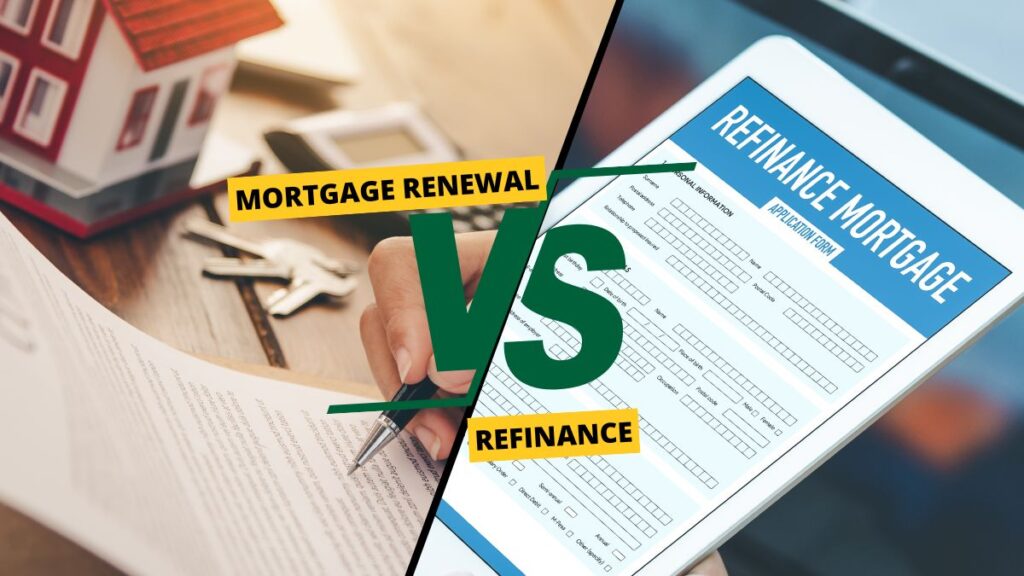Wondering about Mortgage Renewal vs Refinance Canada? Discover the differences, costs, and when to choose each option to save money and reach your financial goals. Get expert advice from AJP Mortgage today
As a new homeowner in Canada, I’m a little confused. My mortgage is up for renewal soon, and I’m not sure whether to just renew with my current lender or refinance. I’ve heard refinance could be a good idea, but I’m not sure if it’s worth the hassle.
I’m not alone—many Canadians don’t shop around when it’s time to renew, which can cost them in the long run. But refinance sounds like it might be complicated and come with extra costs.
In this post, I’ll explain what mortgage renewal and refinance are, and share the pros and cons of each. By the end, you’ll have a better idea of which option works best for you. Let’s get started!
Mortgage Renewal
A mortgage renewal occurs when the term of your current mortgage ends, and you choose to either extend it with your existing lender or explore other options. Think of it as renewing a contract for your loan. However, this renewal doesn’t automatically mean you’re stuck with the same terms—you have the opportunity to negotiate or switch lenders.
How Does it Work?
Receive a Renewal Offer
Your lender typically sends a renewal offer about 120 days (4 months) before your term ends.
Review the Terms
Look at the interest rate, term length, and other conditions in the offer.
Decide on Your Next Steps
Finalize the Renewal
Once agreed upon, the process involves minimal paperwork and no need for a credit check in most cases.
What Affects Your Rate?
Several factors determine the new rate offered during renewal:
Advantages of Renewing
Disadvantages of Renewing
Tips for Mortgage Renewal
By understanding the mortgage renewal process and exploring your options, you can secure terms that align with your financial goals and save money in the long run.
Refinance
Refinance means replacing your current mortgage with a new one. It’s your chance to adjust things like your interest rate, loan term, or even take cash out from your home’s equity.
How Does Refinance Work?
Replace Your Loan:
Your new loan pays off the old one, giving you better terms or lower payments.
Flex Your Options:
Want smaller monthly payments? Or to pay off your home sooner? Refinance gives you options to match your goals.
Tap into Cash:
Use your home’s value to borrow extra money for renovations, paying off debt, or other big expenses.
Why Do People Refinance?
Advantages of Refinance
Disadvantages of Refinance
Pro Tips for Refinance
Refinance is a smart move when you want to save money, access funds, or adjust your mortgage to fit your life better. With the right plan, it’s a win for your wallet and your future!
When to Renew Mortgage
Is your mortgage term coming to an end? Before you renew, make sure you’re getting the best deal possible! Here’s when you should start thinking about renewing your mortgage.
Your Term is Ending
When your mortgage term (usually 1-5 years) is up, it’s time to renew. You’ll get a renewal notice, but you don’t have to accept it right away. It’s a good time to check if you’re still getting the best deal.
Interest Rates Have Dropped
If interest rates are lower than when you first took out your mortgage, it might be a good time to renew and lock in a better rate, which could save you money.
Your Finances Have Changed
If your income has increased or your expenses have changed, you might want to adjust your mortgage. Renewing is a chance to rethink your payments or access your home’s equity.
You Want to Change Lenders
Not happy with your current lender? Renewal is a perfect time to shop around. You can compare rates and see if there’s a better deal out there.
Your Home’s Value Has Gone Up
If your home’s value has increased, you could have more equity to work with. This might be a good time to reassess your mortgage and take advantage of that extra value.
You Want to Adjust Your Terms
Renewal isn’t just about sticking with the same deal. You can change things like your mortgage type (e.g., fixed-rate to variable-rate) or your payment frequency.
As your mortgage term ends, it’s a great time to review your options. At AJP Mortgage, we’re here to help you decide whether to renew, refinance, or explore other options to meet your goals. Let us guide you through it!
When to Go With Refinance?
Thinking about refinancing? Here’s when it makes sense to refinance your mortgage and how it could help you save money or access cash!
To Get a Lower Interest Rate
If interest rates have dropped since you first got your mortgage, refinance can help you lock in a lower rate, which can save you money on your payments.
To Change Your Loan Term
Refinance lets you adjust how long you pay your mortgage. You can shorten your term to pay off your loan faster or extend it to lower your monthly payments.
To Access Extra Cash
If you need money for things like home repairs or paying off debt, refinance can let you tap into your home’s value for cash.
To Switch Your Mortgage Type
If you want to switch from a fixed-rate to a variable-rate mortgage (or the other way around), refinance lets you make that change to fit your needs.
To Get Rid of PMI
If your home has gained enough value, refinance can help you remove Private Mortgage Insurance (PMI), which means lower monthly payments.
If Your Financial Situation Has Improved
If your credit score has gone up or your income has improved, refinance could help you get a better rate and better terms.
If any of these situations sound like yours, refinance might be the right choice. At AJP Mortgage, we’re here to help you decide and guide you through the process!
Ultimate Guide to Mortgage Renewal vs Refinance Canada
Learn when to choose mortgage renewal or home mortgage refinance to save money and meet your goals.
| Feature | Mortgage Renewal | Refinance |
| Definition | Extending your current mortgage with the same lender. | Replacing your current mortgage with a new one. |
| Process | Lender offers new terms when the term ends. | You get a new loan, often with a new lender. |
| Interest Rate | Based on current market rates and your situation. | Can change depending on market rates or lender. |
| Loan Term | Same term or a new term offered by the lender. | You can adjust the loan term (shorter or longer). |
| Home Equity Access | Typically no access to home equity. | You can take cash from your home equity. |
| Closing Costs | Usually no extra fees or minimal costs. | There are extra fees like appraisal or legal fees. |
| Credit Check | No credit check required. | A credit check is usually required. |
| Flexibility | Limited flexibility in changing terms. | High flexibility in changing terms, rate, and loan amount. |
| Main Purpose | To continue your mortgage with the same lender. | To get a better rate, pay off faster, or access home equity. |
| Impact on Credit Score | Little to no impact. | Can temporarily lower your credit score due to credit check. |
| Best for | Homeowners happy with their current lender and rates. | Homeowners looking to lower rates, shorten terms, or access cash. |
Additional Considerations
“Before making a decision, consider all your options! Explore the key factors you should know, including how Canada alternative lenders for mortgages can offer flexible solutions that might suit your needs better.”
Lock-In Periods
If you’re in a lock-in period, you might face extra fees if you try to refinance or make changes.
Check for Fees
Take a look at your mortgage agreement to see if you’re still in a lock-in period. If you are, refinancing or making changes might come with penalties.
Renewing Could Be Easier
If you’re locked in, renewing with your current lender might be a simpler, cheaper option. You avoid extra fees and might still get a good rate.
Prepayment Penalties
Some mortgages charge a fee if you pay off your loan early or make extra payments.
Look for Fees
Before refinance, check if there are any prepayment penalties in your contract. These fees can sometimes be high.
Think About the Cost
If the penalty is steep, refinance might not save you money in the long run. But it’s worth asking your lender if they can reduce or even remove the fee if you plan to refinance.
Talk to a Mortgage Broker
Not sure if you should refinance or just renew? A mortgage broker can help you figure it out.
Common Queries
Mortgage Renewal vs Refinance Pros and Cons
Mortgage Renewal
Pros
Cons
Mortgage Refinance
Pros
Cons
Mortgage Renewal vs Refinance Cost
Mortgage Renewal Costs
Generally Low
If you’re staying with the same lender, renewal costs are usually minimal. You may have to pay a small admin fee in some cases, but that’s about it.
Mortgage Refinance Costs
Potential Fees
How AJP Mortgage Can Help?
At AJP Mortgage, we make getting a mortgage easy and stress-free. Whether you’re renewing, refinance, or just exploring your options, we’re here to guide you every step of the way. Here’s how we can help:
Clear Advice
We’ll explain everything in simple terms, so you always know what your options are. We’ll help you decide if renewing or refinance is the best choice for you.
Best Rates for You
We work with many lenders to find the best rates, so you save money. Whether you stay with your current lender or switch, we’ll help you find the best deal.
Simple Process
We take care of the details and paperwork. We keep the process as easy and stress-free as possible, so you don’t have to worry.
Save Money
Refinance might have some costs, but we’ll make sure it’s worth it. Our goal is to help you save money in the long run with lower rates and better terms.
Use Your Home’s Equity
Need cash for something important? Refinance can help you unlock the value in your home for things like home improvements or paying off debt.
Always Here to Help
Whether it’s your first mortgage or your fifth, we’re here to support you. We’ll make sure you feel comfortable with every step and answer all your questions.
Successful Case Studies
Check out our successful case studies to see how we’ve helped clients just like you achieve their mortgage goals.
Case Study 1: Sarah’s Kitchen Reno
Sarah wanted to renovate her kitchen but didn’t want to take on high-interest debt. We helped her refinance her mortgage and use her home’s equity for the project.
The Problem
Sarah needed extra funds for a kitchen renovation.
The Solution
We refinanced her mortgage and used the equity in her home to pay for the renovation.
The Outcome
Sarah got the kitchen she wanted without taking on high-interest loans.
Case Study 2: Tom and Jane’s Debt Relief
Tom and Jane were struggling with high-interest credit cards and loans. They wanted to simplify things and lower their payments.
The Problem
Too many high-interest debts.
The Solution
We refinanced their mortgage and combined all their debt into one easy payment.
The Outcome
Tom and Jane now have one simple payment, saving money and reducing stress.
At AJP Mortgage, we make the process easy and help you make the best decision for your future. Let us help you find the best mortgage solution for you!
Final Verdict
To wrap it up, mortgage renewal and refinance are two ways to manage your mortgage. Renewal is quick and easy, while refinance gives you more options like adjusting your loan or accessing home equity. By looking at the pros and cons, you can choose the best option for your goals.
Tips
Need help?
Contact AJP Mortgage today for advice on renewal or refinance. We’re here to help!


